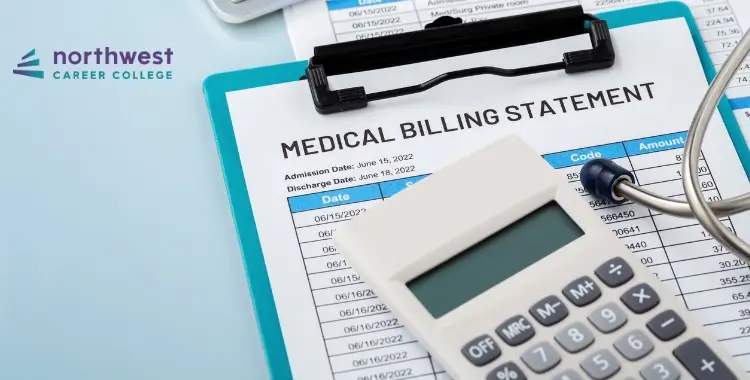5 Myths about Medical Billing and Coding: Debunked!
- Medical Billing and Coding
- March 12, 2024
- 2.7k views
- 6 min read

Are you or someone you know thinking about going back to school to become a medical biller or medical coder, but you are not sure what exactly they do? Or you may have read some stuff online about medical insurance specialists’ scope of practice, but you aren’t sure what to believe.
This article will dispel five common myths about medical billers and coders and hopefully help you feel more confident when deciding if a career in the medical insurance industry is right for you.
Table of Contents
- Myth 1 – Medical Billers and Medical Coders are the same.
- Myth 2 – It’s easy to become a Medical Biller or Medical Coder with On-the-job Training.
- Myth 3 – It’s a tedious desk job.
- Myth 4 – Automation will replace Medical Billing and Medical Coding jobs.
- Myth 5 – There’s no room for career growth.
- Conclusion
Myth 1 – Medical Billers and Medical Coders are the same.
Although “medical billing and coding” is often referred to in a single phrase, medical billers and medical coders are not interchangeable roles.
Medical billers focus on revenue cycle management. They start by ensuring that the medical front office collects all the necessary insurance and demographic information from patients. They then make sure medical claims are submitted in a timely manner. Once claims have been processed, they focus on collecting payment from the patient or insurance companies. Finally, once payments are received, they post the payments against the patient’s account.
Medical coders decipher patient diagnoses and treatments described by practitioners in their procedure notes and translate them into CPT or HCPCS codes. These two coding systems are specialty codes used to communicate which procedures were done from the medical office or hospital, respectively, to the insurance company.
Myth 2 – It’s easy to become a Medical Biller or Medical Coder with On-the-job Training.
Many people think that you can begin your career as a medical biller or medical coder with no prior experience in a healthcare facility and without formal training. While many experienced medical insurance professionals do not have formal education, they typically started their careers when the insurance industry was much simpler than it is today and learned on the job along the way.
However, over the past several decades, the number of insurance companies has grown significantly, the complexity of coding systems has increased to accommodate a greater number of diagnoses and procedures, and revenue cycle management has gotten more difficult. As a result, barriers to entry into the field and formal training are more important than ever.
People seeking to become professional medical billers and coders are typically best served by obtaining specialized training and certification. Employers recognize that if you do not have pre-existing experience or formal training, it will require a significant amount of work to get you up to speed as a medical biller or medical coder.
Not only would employers need to teach you how to use their electronic medical records system and claims management system, but you also need to know medical terminology, anatomy and physiology, and various medical coding systems. And that’s before you learn anything about their specific office’s or practice’s workflows. This typically requires more time and effort than employers are willing to invest, given that there are options to hire people with education or experience.
Myth 3 – It’s a tedious desk job.
Too often, people have a false impression of medical billers and coders as individuals alone in cubicles, endlessly tapping away on their computer keyboards. They believe that the job responsibilities are repetitive and mundane.
Although some elements are repetitive, like most jobs, working as a medical biller or coder can be impactful and rewarding. They are an essential part of the healthcare machine, ensuring that healthcare providers get paid, patients receive accurate bills, and insurance claims are processed accurately and efficiently. Without their contributions, many patients would end up overpaying for their care, or providers would be underpaid for their services.
As for their direct responsibilities, medical coders sometimes seem to be doing detective work as they seek the proper description of diagnoses and procedures. Medical billers sometimes seem to be waging quasi-legal battles with the insurance companies as they seek pre-authorization for various procedures or appeal an improperly denied claim. Ultimately, these roles can be very dynamic and have a tangible impact.
Myth 4 – Automation will replace Medical Billing and Medical Coding jobs.
As we hear about in the news all the time now, many people believe computer systems and AI robots will be swooping into place humans in practically every white-collar job over the next ten years. The medical billing and coding industry has not been immune to these concerns.
Providers have started self-coding their procedures more frequently as electronic medical records systems become more advanced, leading some to believe that this process will be fully automated in the near future. However, medical coders still play an instrumental role in reviewing the notes and codes entered by the providers and adjusting them as needed to maximize reimbursement. Division of labor related to these functions still helps optimize the efficiency of the medical industry.
Additionally, while automation can be a helpful assistant for specific tasks, we are far away from artificial intelligence replacing human intelligence. Medical billers and coders must apply critical thinking, problem-solving, and decision-making skills that computer technology still cannot replicate.
Myth 5 – There’s no room for career growth.
Many assume that a career in medical coding is a dead-end street with no chance of professional growth. This could not be further from the truth.
There are numerous career pathways available to medical billers and coders who are seeking to take on more responsibilities. You can specialize in billing, coding, or insurance credentialing, for example. You can also work in compliance, work for an insurance company directly, become a supervisor, or become an educator. Numerous opportunities for advanced education and specialty certifications can help you advance as well.
Conclusion
As we addressed some prominent myths surrounding medical billing and coding, this profession offers much more than you might expect.
It is a skilled career that requires introductory and ongoing training and one that is unlikely to be replaced by automation in the near future. There are growth opportunities, and in the meantime, you can feel great about playing an essential role in the healthcare industry. If you are considering a career in medical billing and coding, we hope this information helps you decide if it’s right for you!





